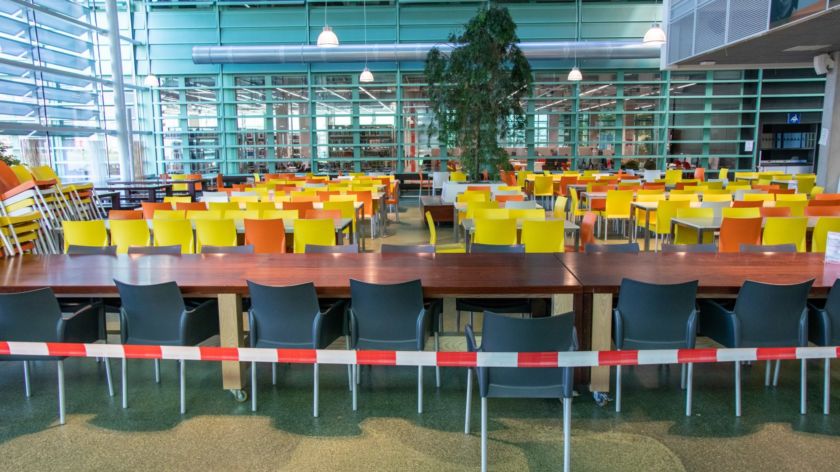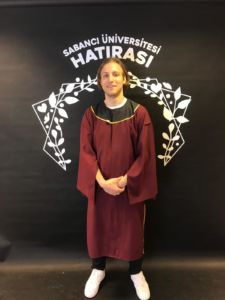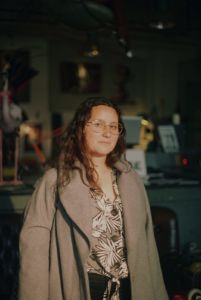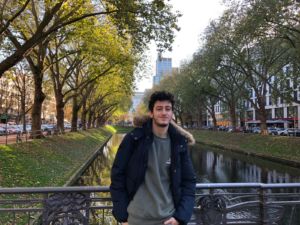The university consists of some faces on a screen
-
 Foto: Rein Wieringa
Foto: Rein Wieringa
Many students who started in september have barely seen the campus in real life. For them, the university is a virtual space, not a place where you have social interactions, study meetings and drinks after class. 'I don't understand why I am here, I can do all my necessary things online in Turkey.'
First-year students arrive at Radboud and immediately have an impression of the campus. Its large grey buildings, the open space of the Refter, the students meeting up together outside or in the Culture Café and the filled study spaces of the library. In the first weeks, you build an impression of the lectures, the intensity of the studies and you learn to adjust yourself to the pace of the student life.
With the first-year students starting this year at home, many of them have never seen the campus. Some may have come to campus every now and then for lectures or seminars, but they have no idea what it would be like outside the pandemic. Everything has moved online, and study spaces on campus are limited. So how do these students relate to Radboud as a campus? Do they perceive the university as anything more than a virtual classroom with small screens reflecting other equally isolated students?
Virtual campus tours
Lidwien Cluitmans is the Study Advisor for English Language and Culture studies (ELC) in the Faculty of the Arts. She is normally a face that first year students see during Orientation Week, that they can connect to the faculty and whose office they can go to for help. For many students, she is the first person to go to when something comes up.
‘I hope the mentor programme can be a bridge for when we go back to a more normal situation’
This year, many Orientation Week activities were moved online. The study associations GAG and USA led a virtual campus tour. ‘I presented myself with a PowerPoint presentation, so at least they got to see me there,’ Cluitmans says.
ELC has implemented a mentoring program for first-year students this year. ‘I think the mentoring programme is good,’ she says. ‘Hopefully, it can be a bridge for when we go back to a more normal situation’. Mentors keep track of the students’ progress and in the case of international students, their general whereabouts. This was important for Cluitmans, because as a study advisor she wanted ‘to get a grip on my student population, know how everyone is and make sure that everyone is doing alright and participating. Also for their wellbeing’.
In comparison to previous years, the students are just as willing to turn to her for help during her consultation hours, even when they have been moved to Zoom. ‘During my consultation hours I always call students and there are some students who have been at the university for a while, so we already know each other so when you call them you already have a familiar face. But for the first-year students that’s different, so that’s why I think the mentoring program is good.’

Buildings and spaces
For some students, it has been difficult to adjust to the online environment of Radboud. For Metehan Gencmazlumo, this was the case. Gencmazlumo started his Pre-Master’s program in Business Administration this year and was shocked to find out that all but one of his classes are online. ‘I have one class at the university. But it does not feel like a campus, it feels like buildings and spaces, it does not have the social aspect of a campus.’
Gencmazlumo is from Turkey and decided to study at Radboud after doing an internship in the Netherlands. ‘The University encouraged international students to come live here if they were going to study here. I can’t understand why though, because I can do all my necessary things online in Turkey. I wanted to come here to start a new chapter, but the university needs to provide a little more to who are staying here and are from abroad.’
With less opportunities to have social connections with his classmates, this means Gencmazlumo has fewer opportunities to practice his English outside of his studies. His perception of the campus is that it is limited to academics. ‘I have just met my roommates and other than my one course and some Zoom calls with friends I have no other opportunities to socialise or take part in social events.’
Find internships
Phoebe Dennis, a first year master’s student in Global Environments and Sustainability Studies, is from Australia and lives in the Netherlands, with a Greek citizenship. She feels similarly about the university; although she is in contact with many fellow students via WhatsApp, there are few opportunities for them to socialise physically.

Dennis has the added struggle of having to find an internship. Due to the Corona crisis, finding an internship has become doubly challenging. ‘We don’t know who to contact or how to go about it.’
According to Dennis, the university does not seem to be providing guidance on this front for the students who are not familiar with this process – many of them international students. ‘I feel like I am not getting a lot of proactive, practical support although my study advisor is great and sympathetic to our situation.’ Phoebe also mentioned that it must be so much harder for international students who arrived in Nijmegen in August and also have to deal with adjusting to the culture, while she has been living here for a year and has had time to become accustomed to the Netherlands.
Motivation
Nadav Geron, a second-year international student in Business administration with a minor in communication, has found it difficult to keep relationships with fellow students and keep the motivation high. Geron is from Israel and moved to Germany with his family when he was young. It is not possible for him to stay at home while studying, one of the reasons being that he has a mandatory class on campus that does not have an online alternative.

He says students who were in quarantine and were not able to attend had to be dialed in via Skype by a friend to be able to participate. ‘We are excused for not attending but this is not really beneficial, it is not sufficient to provide literature and slides from seminars. That is why it is tricky to attend from abroad’.
Geron points out the difficulty in following prerecorded lectures and hopes professors would see the value in having live online lectures. ‘Referring us to old footage just diminishes furthermore from the already limited amount of teaching that is offered to us.’ The corona crisis threw him into stagnation of his studies. ‘You really need a lot more motivation to study and you really need to put into question why you are studying and what you are doing at university. People that are not as motivated to study but who are more connected with the university socially, are having a much harder time’.



